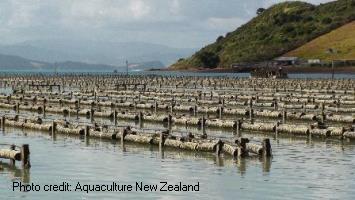
There are 554 farms authorised to grow oysters in New Zealand, covering a total of around 2200 ha (as of March 2009). In 2008 the export value of New Zealand's Pacific oysters (
Crassostrea gigas) was $16.9 million – a slight increase from 2007 when the export value was $16.5 million.
The main Pacific oyster farming areas are located in sheltered bays and harbours around the North Island. In particular, Pacific oyster farming takes place in the Whangaroa, Mahurangi, and Kaipara harbours, as well as the Coromandel and the Bay of Islands.
The farming method for Pacific oysters consists of wooden racks to which the oysters are attached. The racks are anchored in the lower intertidal region.
Farmers began raising native New Zealand rock oysters in the early 1960s. Around 1970, the Pacific oyster was accidentally introduced to New Zealand from Asia (possibly on vessel hulls or in their ballast water). Farmers discovered the Pacific oyster grew faster and could be farmed more reliably than its native cousin. By the mid-1970s, Pacific oysters had become the main farm-raised oyster in New Zealand.
At www.aquaculture.govt.nz you can learn more about ecological effects, food safety, production systems, and planning and legislation for Pacific oysters.